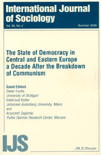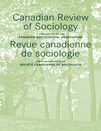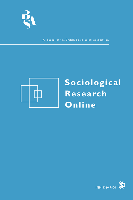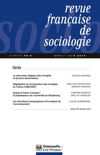
SOCIOLOGICAL FORUM
Scope & Guideline
Advancing sociological insights for a better tomorrow.
Introduction
Aims and Scopes
- Social Inequality and Class Issues:
Research exploring the intersections of race, class, and gender as they relate to social inequality, including the impact of socioeconomic status on civic engagement, education, and health. - Migration and Refugee Studies:
Studies focusing on the experiences of migrants and refugees, including their integration challenges, identity formation, and the socio-political implications of migration. - Public Engagement and Sociology:
Emphasis on publicly engaged sociology, where research aims to address social problems and promote community involvement through participatory methodologies. - Cultural and Political Sociology:
Investigations into the cultural dimensions of politics, including nationalism, populism, and the role of religion in shaping political ideologies and movements. - Environmental Sociology:
Research examining the sociological aspects of environmental issues, including climate change, sustainability, and the social impacts of ecological crises. - Intersectionality and Identity Politics:
Exploration of how various forms of identity (race, gender, class) intersect and influence social dynamics, activism, and personal experiences.
Trending and Emerging
- Civic Engagement and Activism:
A growing focus on civic engagement, particularly in the context of marginalized communities and social movements, highlights the importance of grassroots activism and participatory research. - Climate Justice and Environmental Sociology:
Research addressing the intersection of social inequality and environmental issues is gaining prominence, reflecting the urgency of climate change and its disproportionate impact on vulnerable populations. - Mental Health and Well-being:
An increasing number of studies explore the sociological aspects of mental health, particularly in relation to social identities, inequalities, and the impacts of societal pressures. - Digital Sociology and Technology:
The impact of digital technology on social interactions, identity formation, and community engagement is an emerging theme, reflecting the growing significance of online platforms in contemporary life. - Transnational and Comparative Studies:
There is a rising interest in transnational sociological research that compares different cultural and social contexts, particularly regarding migration, identity, and global inequalities.
Declining or Waning
- Traditional Labor Studies:
Research focusing on labor movements and traditional workplace dynamics has seen a decline, possibly due to the increasing prevalence of gig economy and freelance work, which shifts the focus to new forms of labor organization. - Rural Sociology:
Themes specifically related to rural sociology and issues affecting rural communities appear to be waning, as the journal increasingly prioritizes urban and metropolitan studies, reflecting broader demographic trends. - Historical Sociology:
The exploration of historical sociological themes has decreased, possibly overshadowed by more contemporary issues and the urgency of current social challenges. - Sociology of Religion:
While still relevant, papers specifically addressing the sociology of religion are appearing less frequently, as the journal's scope broadens to encompass more pressing social issues like climate change and migration. - Quantitative Methodologies:
There seems to be a reduction in the emphasis on quantitative methodologies in favor of qualitative and mixed-method approaches, reflecting a shift towards more nuanced and context-rich sociological analyses.
Similar Journals

COMPARATIVE SOCIOLOGY
Exploring the intricacies of society across borders.COMPARATIVE SOCIOLOGY, published by BRILL in the Netherlands, serves as a pivotal platform for researchers and scholars in the fields of sociology and political science. With an ISSN of 1569-1322 and E-ISSN 1569-1330, this journal has established a focus on comparative analyses that enhance our understanding of social dynamics across diverse cultures and political systems. Although currently not Open Access, it remains accessible to academic institutions and individuals committed to advancing sociological inquiry. Recognized in the 2023 category quartiles as Q3 in Sociology and Political Science, COMPARATIVE SOCIOLOGY ranks 866th out of 1466 journals in its field, indicating a growing influence among contemporary scholarly dialogues. Spanning contributions from 1970 and continuing to the present, the journal aims to bridge theoretical insights with empirical research, offering a comprehensive resource for students, professionals, and academics dedicated to the nuanced study of societal structures and transformations. Join a community of thought leaders and engage with innovative ideas that challenge conventional understandings in this vital area of social research.

International Journal of Sociology
Empowering Scholars to Transform Social UnderstandingInternational Journal of Sociology, published by Routledge Journals, Taylor & Francis Ltd, stands as a premier platform for innovative sociological research and discourse. With an impressive Q1 ranking in Social Sciences (miscellaneous) for 2023 and a significant Scopus rank of #54 out of 275, this journal promotes high-quality scholarship that informs and shapes contemporary sociological thought. The journal caters to a diverse readership, including researchers, professionals, and students, by disseminating rigorous empirical studies, theoretical advancements, and critical reviews that dive deep into the complexities of social behavior and structure. While the journal operates under a traditional access model, its commitment to fostering knowledge in the field is evident as it converges various aspects of sociology from 2019 to 2024. Engaging with articles from the International Journal of Sociology not only enriches understanding but also contributes to meaningful societal change.

Canadian Review of Sociology-Revue Canadienne de Sociologie
Advancing Sociological Insights Since 1964.Canadian Review of Sociology-Revue Canadienne de Sociologie is a prestigious journal tailored for sociologists and social scientists, published by WILEY. Since its inception in 1964, this esteemed journal has served as a critical platform for the dissemination of high-quality research in both the arts and humanities and broader social sciences, holding a commendable Q1 ranking in Arts and Humanities and Q2 ranking in Social Sciences as of 2023. With an impressive Scopus percentile ranking—78th in Arts and Humanities and 73rd in General Social Sciences—the journal underscores its influence and relevance in contemporary sociological discourse. Researchers and practitioners alike can expect rigorous peer-reviewed articles that contribute to theoretical and empirical debates, as well as discussions on pressing societal issues. While currently not open access, the journal continues to be integral for academic institutions and researchers keen on exploring the intricacies of sociological phenomena across generational and cross-cultural lines, with converged years extending to 2024. Addressed from Hoboken, NJ, the journal not only enriches the academic landscape but also cultivates a global community of sociologists committed to advancing knowledge.

SOCIOLOGICAL INQUIRY
Exploring the Depths of Social PhenomenaSociological Inquiry is a premier journal in the field of sociology, published by Wiley, which has established its reputation through rigorous peer review and scholarly excellence since its inception in 1961. The journal carries the ISSN 0038-0245 and E-ISSN 1475-682X, and is located in the vibrant academic landscape of the United Kingdom. With a notable impact factor and ranked in the Q1 category in Sociology and Political Science, it stands among the top 17% of journals in its field, as indicated by its Scopus rank of 250 out of 1466, reflecting an impressive 82nd percentile. The objective of Sociological Inquiry is to advance the understanding of social phenomena through empirical and theoretical contributions, aiming to foster dialogue among sociologists, political scientists, and interdisciplinary scholars. Despite not offering open access options, this journal remains vital for anyone looking to engage with cutting-edge research that shapes contemporary sociological thought and practice.

Annual Review of Sociology
Navigating the Landscape of Sociological InquiryAnnual Review of Sociology, published by Annual Reviews, is a premier academic journal that plays a critical role in advancing the field of sociology. Established as a leading publication since its inception in 1975, the journal brings together the highest quality scholarly reviews, summarizing key developments and trends within the discipline. With a notable Q1 ranking in both Sociology and Political Science and a remarkable 99th percentile Scopus rank among over 1400 journals, it consistently showcases cutting-edge research and invites contributions from preeminent scholars. The journal's rigorous review process ensures that articles provide comprehensive insights and critical analyses, making it an essential resource for researchers, professionals, and students alike. Although it is not an open-access publication, its influential content is crucial for anyone looking to deepen their understanding of social structures, relationships, and dynamics. Located in the heart of Palo Alto, California, the Annual Review of Sociology continues to be a cornerstone in the academic fabric of the social sciences.

Istanbul Universitesi Sosyoloji Dergisi-Istanbul University Journal of Sociology
Bridging research and theory for a vibrant academic community.Istanbul Universitesi Sosyoloji Dergisi (Istanbul University Journal of Sociology), with ISSN 1304-2998 and E-ISSN 2667-6931, serves as a pivotal platform for the dissemination of sociological research and thought in Turkey and beyond. Published by the Faculty of Letters, Department of Sociology at Istanbul University, this journal is committed to advancing the discipline of sociology through open access, which has been available since 2017, ensuring that vital research reaches a broad audience. With a focus on a diverse array of sociological topics, the journal aims to foster interdisciplinary dialogue and provide a forum for innovative theoretical perspectives and empirical studies. By bridging local and global sociological discussions, this journal seeks to appeal to researchers, professionals, and students alike, reinforcing its status as an essential resource in the social sciences. The journal’s commitment to high-quality scholarship continues to enhance its visibility and relevance in the academic community.

SOCIOLOGICAL RESEARCH ONLINE
Diving deep into the heart of sociology and political science.Sociological Research Online, published by SAGE Publications Ltd, stands as a pivotal open-access journal in the fields of sociology and political science. Established in 1996 and continuously published until the present, this journal provides a platform for innovative and robust sociological research, contributing to significant theoretical and empirical discussions in the discipline. With an impressive Q2 ranking in the 2023 category quartiles, it positions itself among the top 29% of journals in its field, as evidenced by its Scopus rank of #414 out of 1466. The journal fosters accessible scholarship and encourages the dissemination of research that engages both academic and public audiences. By including a wide array of methodological approaches and diverse perspectives, Sociological Research Online not only supports the advancement of knowledge but also enhances understanding of social issues in contemporary society, making it an essential resource for researchers, professionals, and students alike.

REVUE FRANCAISE DE SOCIOLOGIE
Fostering Critical Discourse in Sociology and Political ScienceREVUE FRANCAISE DE SOCIOLOGIE, published by PRESSES SCIENCES PO, is a prominent journal dedicated to the fields of sociology and political science, characterized by its rich historical contributions since its inception in 1977. With a commitment to scholarly excellence, the journal currently holds a Q3 ranking in its category for 2023, illustrating its relevance within the academic community. This esteemed publication offers a platform for innovative research and critical discourse, catering to both established scholars and emerging voices in the social sciences. The journal seeks to explore contemporary sociological issues through rigorous empirical analysis and theoretical reflection, fostering a deeper understanding of socio-political dynamics. Although it does not offer Open Access options, REVUE FRANCAISE DE SOCIOLOGIE remains a vital resource for researchers and students alike, providing access to cutting-edge scholarship that shapes the conversation around societal structures and political frameworks.

Sociologija
Fostering Global Discourse in Social SciencesSociologija is a pioneering, peer-reviewed journal published by the University of Belgrade, Faculty of Philosophy, dedicated to advancing the field of sociology and related social sciences. Since its transition to Open Access in 2002, the journal has made significant strides in disseminating vital research and fostering academic discourse within and beyond its Serbian context. As of 2023, it is classified in the Q3 quartile of the Social Sciences category, reflecting its contributions to the academic community, with a Scopus ranking of #188 out of 275 in General Social Sciences. The journal spans a convergence period from 2007 to 2024, inviting submissions that engage with contemporary sociological theories and issues. Sociologija’s commitment to open accessibility ensures that critical research reaches a broader audience, supporting scholars, practitioners, and students in their quest for knowledge and understanding of social phenomena. With its headquarters in Belgrade, Serbia, the journal serves as a significant platform for regional and international scholarship, and plays a crucial role in the global discourse on social science.

AMERICAN SOCIOLOGIST
Navigating Societal Complexity Through ScholarshipAMERICAN SOCIOLOGIST is a prominent academic journal published by SPRINGER, representing a vital resource in the fields of sociology and political science. With an ISSN of 0003-1232 and an E-ISSN of 1936-4784, this journal has contributed significantly to the sociological literature since its inception, offering insights that challenge conventional thought and stimulate critical discussion. The journal has maintained its relevance throughout various converged years, ensuring a comprehensive exploration of sociological topics from 1973 to 2024. Currently, it holds a commendable status in the second quartile (Q2) within both Social Sciences (miscellaneous) and Sociology and Political Science categories, reflecting its robust impact and academic influence, with Scopus ranks placing it in the 52nd percentile across its fields. Though it operates under a subscription model, the journal provides crucial access for researchers, professionals, and students keen on uncovering contemporary issues and advancements in sociology. With its dedication to fostering an understanding of complex societal dynamics, AMERICAN SOCIOLOGIST is an essential platform for disseminating pioneering research and innovative ideas that shape our understanding of social phenomena.